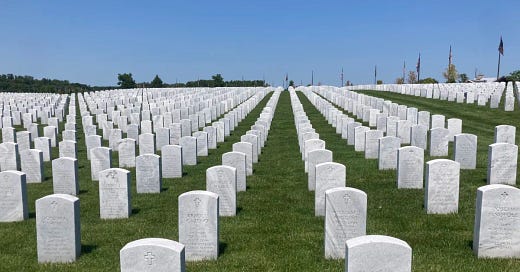Honoring your ancestors is important. That’s why I am currently on vacation in the homeland of my forefathers: Michigan. Coming from 100-plus-degree Texas, the 80-degree breeze here feels like sweet relief. The idyllic rolling hills dotted by half-timbered houses are even more calming. As we drive to visit the gravesites of my maternal ancestors, I notice that the roads are smooth, free of billboards, and the grass in between them is well-manicured.
The cemetery we arrive at is quite small — maybe 200 graves at most. On one side of a quiet street are the old graves. In this section, the marble obelisks and stone rectangular prisms we pass are small and many have sunk under shady oak trees. Etchings are rubbed beyond recognition or are covered with lichen. Even still, we have the good fortune to find my third-time great-grandfather, John, who lies between his first and second wife. His grave is simple; it tells us that John died in 1915, nothing more.
Courtesy of my grandmother, I have a love letter from John to his second wife, Cora. The letter was a direct and loving proposal for her hand in marriage. Now standing in front of their graves, I marvel at how that proposal, and Cora’s acceptance of it, led directly to my birth over one hundred years later. For generations (six to be exact, and perhaps longer), my family had lived in one county of Michigan, building, tending, and farming. This boggles my mind, especially considering the atomization of the American intergenerational family that took place post-Industrial Revolution.
I feel sad standing among my family, but thousands of miles from my home. Part of me wants to abandon the Texas I love and move back to where they are — where they were. The longing is enhanced by the beautiful summer weather and the noticeable lack of fences between homes. Where my husband and I live, houses are crammed next to each other, only separated by tall, wooden fences that block the imposing eyes of neighbors. Here, plots of land flow together, giving the entire countryside a homey, communal feel. You can understand the ease with which people walked over to ask their neighbors for some sugar.
Driving to the next cemetery, I see that small businesses are everywhere. I figure that they are the reason this region was not hollowed out by the outsourcing of car industry jobs to China and Mexico. Everyone who did not stay in Michigan and start a business (i.e. my parents) likely moved first to college and finally, where the job was. This industrial reality makes the 13 children my five-time great-grandfather had seem to be an impossible project today. When you’re all alone — without the support of siblings, parents, and spouse — what hope do you have?
This next cemetery is newer, sleeker, and ginormous. While it is well-kept, it is no family plot — every space is marked on a map that depicts the long and winding roads that roll around gravesite sections. I see the prices for a full burial upkeep — over $1,000. We scour the plaques in the ground to find my great-grandmother who died in 2022. We pay our respects and quickly bid the picture-perfect grounds adieu.
The final stop: the Great Lakes military cemetery. Here, my great-uncle lies. He was a veteran of the Vietnam War — serving in the US Army from 1966 to 1968. My grandmother says he was never the same after he came back. Gordon has a complicated legacy in our family, but in this cemetery, he is the same as everyone else. Every headstone is nearly identical here; there are rows upon rows of perfectly shaped, same-sized marble blocks. While some note accolades — Purple Hearts, and the like — no one stands out, from the lowest private to the highest general.
We may visit more graves on this trip. It is good that we did today. Before my conversion, I cannot say I felt any particular reverence when I passed a cemetery. Now, I have a far more robust respect for tradition, for legacy, for family. My forefathers raised children. They farmed. They (apparently) wrote poetry. They have lessons to teach me even now, as they make up the “cloud of witnesses” that surround me. The lesson I learned today from my third-great-grandfather: Be direct, be kind, and be with your family always, until the end of the age.






My ancestors are buried in Ireland and Scotland so I never get to pay my respects in person. But that is the wonder of prayer: we can pray for our forefathers, chosen by God, and honour our ancestry, despite the distances that circumstances impose.
Just now I am on holiday in the south of France, in Menton. The cemetery at the summit of the old town centre includes that of Prince Andre Nikita Lwoff, 1901-1932. I know nothing more about him. I surmise he fled the Revolution aged 16, and ended up in Paris, where so many Russian aristocrats became taxi
drivers. Then died of TB (?) on the Riviera as a still young man. We have our own ancestors and then all the other people, known and unknown, whom we hope to meet in eternity. (Sorry for the digression.)